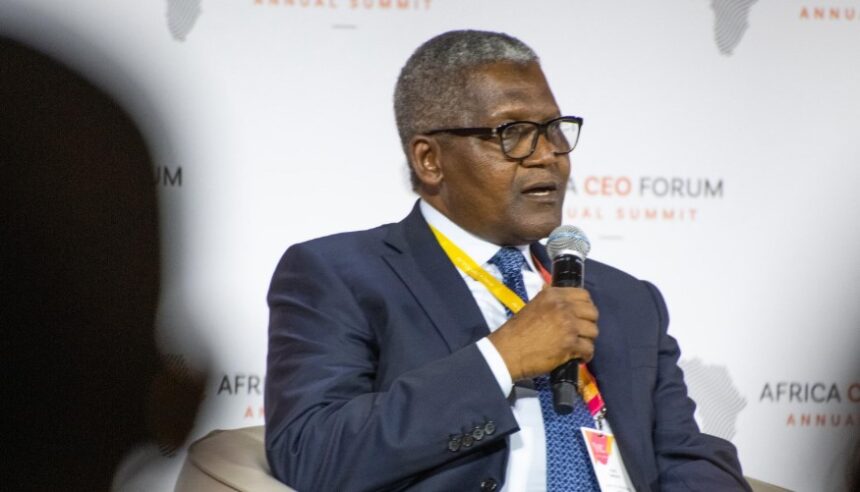Dangote’s Refinery: A Battle for Survival Against Entrenched Interests
Alhaji Aliko Dangote, President of the Dangote Group and Africa’s richest man, has publicly declared his ongoing struggle to ensure the survival of his $20 billion refinery, a monumental project aimed at revolutionizing Nigeria’s petroleum industry. This fight, he asserts, is far from over, but he remains confident in his eventual victory, citing his lifelong experience in overcoming challenges. At the heart of this struggle lies a conflict with powerful vested interests who have long profited from Nigeria’s dependence on imported, subsidized fuel. These individuals, according to Dangote, are actively working to sabotage the refinery’s operations, fearing its potential to disrupt their lucrative business model. Their resistance manifests in various forms, including funding opposition to the Tinubu government’s removal of fuel subsidies, a policy that directly threatens their established revenue streams.
Dangote’s refinery, with a capacity of 650,000 barrels per day, has been hailed as a potential game-changer for Nigeria’s energy sector. Its ability to refine crude oil domestically promises to significantly reduce the country’s reliance on expensive fuel imports, a major drain on the nation’s economy. However, this very potential has made it a target for those who benefit from the current system. These entrenched interests, according to Dangote, have employed various tactics to undermine the refinery, including restricting access to crude oil supplies and facilitating the importation of substandard petroleum products. These actions are designed to maintain their dominance in the market and protect their profits.
This is not the first time Dangote has spoken out about these challenges. He has previously accused international oil companies (IOCs) and the Nigerian Midstream and Downstream Petroleum Regulatory Authority (NMDPRA) of actively working against his refinery. The IOCs, he alleges, have inflated the price of local crude, forcing the refinery to source its supply from international markets at a higher cost. The NMDPRA, on the other hand, has been accused of issuing licenses for the importation of low-quality fuel, further undermining the refinery’s efforts to establish a market for its higher-quality products. These accusations paint a picture of a concerted effort to stifle competition and maintain the status quo.
The struggle surrounding Dangote’s refinery highlights the deep-seated challenges facing Nigeria’s energy sector. The removal of fuel subsidies, while a necessary step towards economic reform, has created an environment of heightened competition and exposed the vested interests that have long benefited from the old system. Dangote’s refinery represents a direct threat to these interests, and their resistance underscores the difficulty of implementing meaningful change in a sector dominated by powerful players. The refinery’s potential to create local jobs, boost the national economy, and ensure fuel security is undeniable, but the road to realizing this potential is fraught with obstacles.
Amidst this complex battle, Dangote has found support from some quarters, particularly from the Independent Petroleum Marketers Association of Nigeria (IPMAN). IPMAN members, while acknowledging the potential impact on their own businesses, have expressed solidarity with Dangote’s efforts to break the dominance of the entrenched interests. They recognize the long-term benefits of a more competitive and efficient energy sector, even if it means short-term adjustments. However, other industry players, like the Petroleum Products Retail Outlet Owners Association of Nigeria (PETROAN), advocate for a more conciliatory approach, suggesting a level playing field for all participants in the downstream sector. They believe that competition should be healthy and encourage cooperation between Dangote’s refinery and other industry players.
The introduction of the naira-for-crude deal, which allows the Dangote refinery to purchase crude oil in local currency, further complicates the situation. While this policy initially led to a drop in fuel prices, benefiting consumers, it also drew criticism from fuel importers who claimed it placed them at a disadvantage. The subsequent suspension of this deal highlights the delicate balance the government must strike between supporting domestic refining capacity and managing the interests of other stakeholders in the petroleum sector. The future of the naira-for-crude deal remains uncertain, but its initial impact demonstrates the potential for policy changes to disrupt the existing market dynamics and create new opportunities for growth. Dangote’s fight, therefore, is not simply a business struggle; it’s a battle for the future of Nigeria’s energy sector, a sector ripe for transformation but hindered by powerful forces resisting change.














